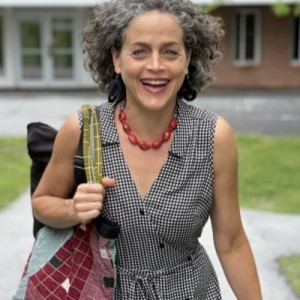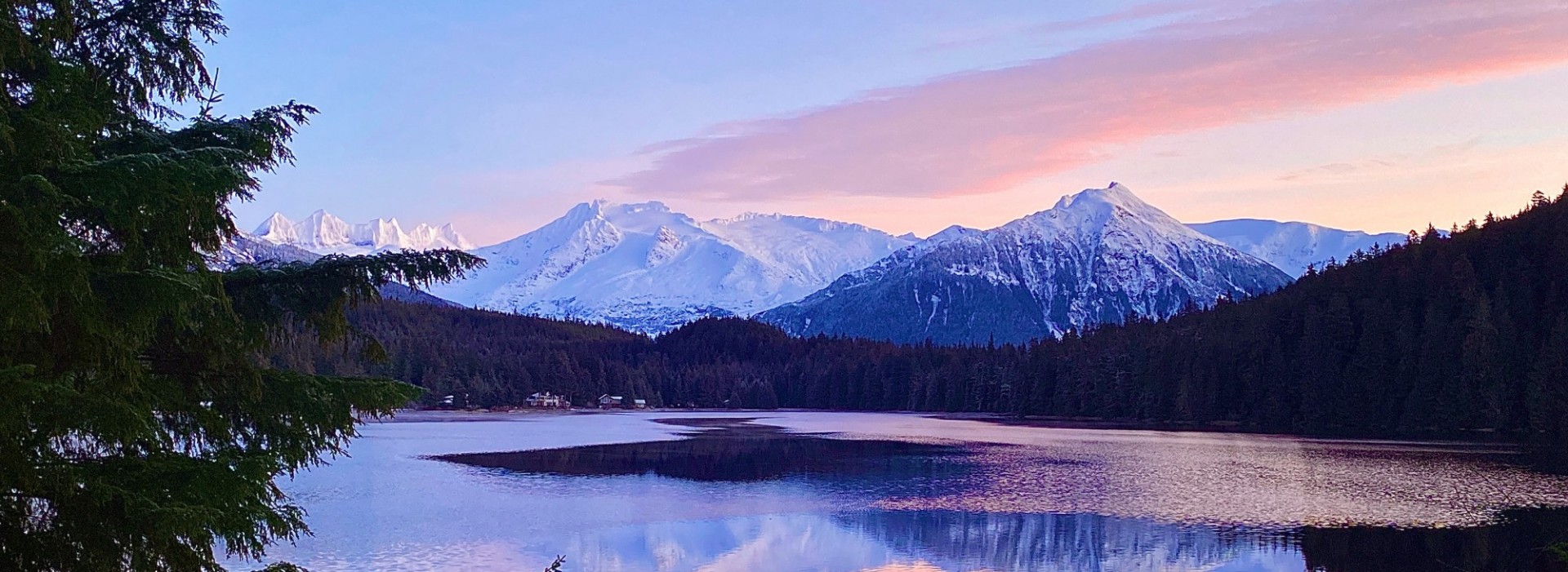Alaska - Climate Communications and Exploration
As the first place in the Americas settled by humans, more than 15,000 years ago, Alaska is home to the continent’s most ancient cultures, each with a rich storytelling tradition; these cultures adapted to harsh and varying conditions. From the interior tundra to the glaciated coastline of the Kenai Peninsula, climate change has drastically shifted indigenous communities’ traditional ways of life. Melting sea ice coverage and a reduced hunting season is quickly impacting food security across groups, and cultures that have survived for millennia now face new threats to their livelihoods and traditions.
Go in-depth into the drastic impacts of climate change on Alaska and its indigenous communities as you learn how to shape and communicate climate realities effectively, with a narrative approach that is solutions-focused. Climate change communication begins with being curious, gaining knowledge, and becoming mobilized towards a critical complex challenge. Learn directly from a Columbia Climate School expert about how individuals and communities come to understand and take action on climate change through our communication and experiences with other people. Students will work with scientists, scholars, and local communities to gain new perspectives on how different Alaskan communities are facing climate change, how these communities might adapt, and why leveraging community knowledge and shared experiences are essential and must be considered in addressing current challenges.
Explore the Peterson Bay Field station on the Kenai Peninsula to learn how the center encourages preservation and sustainability through research and stewardship through education. Spend a day listening to and learning from native storytellers and cultural representatives at the Alaska Native Heritage Center, a living cultural center dedicated to preserving and celebrating native groups from across the state. Hone in on federally managed public land in Alaska and key controversies. Gain insights into climate change adaptation policy in the context of Alaska, and how public lands and indigenous communities are impacted. Visit one of Alaska’s 100,000 receding glaciers as you explore the ice with local guides. Hike in Denali National Park with local experts to witness America’s tallest mountain, Mt. Denali, firsthand and learn about its place in indigenous worldbuilding myths. Cap your trip by applying what you have learned to shape the climate change narrative towards just solutions and share stories from local communities about climate change impacts in their environments.
Students will gain a deeper understanding of how human stories are a fundamental part to climate communications because our narratives allow us to share lived experiences, interpret our own actions and roles within a larger climate system, creating meaning, and provide relatable anxieties about our futures. After this experience, students will be able to further explain the complexities of climate change from a local context that is being deeply affected by global processes. But perhaps more importantly, they will understand how storytelling and effective communication can change narrative, bring communities together, and create a sustainable change.
Program Length: 12 days
Program Dates: July 17- July 28, 2023
Program Fee: $7,990
Program Capacity: 18 students + 2 Putney Student Travel leaders + 1 Columbia Climate School expert
Specific Locations: Anchorage, Homer, Denali
Putney Student Travel experience in this destination: Putney Student Travel has been operating programs in Alaska, as Putney and National Geographic Student Expeditions, since the 1990’s.
Highlights
- Gain perspective on Alaska Native culture through workshops at the Native Heritage Center in Anchorage
- Learn to use language, imagination, and creativity to share how Alaskan communities are adapting to local and global climate challenges
- Go tide pooling by the pristine waters of Kachemak Bay at the southwestern tip of Kenai Peninsula.
- Discuss the effects of climate change on Alaska’s glaciers and its direct impacts on indigenous communities and established ways of life with naturalist guides
- Scout for moose, caribou, and grizzlies as you explore Denali National Park
- Explore and produce work across disciplines using compelling communication and storytelling methods that are powerful mediums
- Immerse in research alongside experts and translate this learning to new audiences through the power of storytelling and climate communication
Columbia Climate School Expert

Lisa Dale co-directs and teaches at Columbia University’s Climate School in the Undergraduate Program on Sustainable Development. Trained as a political scientist, her research explores the way policies at all levels of government can enhance the adaptive capacity of rural communities. She studies this dynamic in the American West through research on wildfire policy, and in Sub-Saharan Africa through research on resettlement policy in Rwanda. Lisa graduated with a Ph.D. in Environmental Policy from Colorado State University (2003). Her background includes several years as a policy analyst with the State of Colorado’s Department of Natural Resources. She currently lives and works in New York City, with a secondary academic appointment at the University of Rwanda.
Itinerary
Days 1-2: Anchorage, AK
Begin your adventure in the city of Anchorage, which serves as the gateway to both interior Alaska and the Kenai Peninsula. Get to know your group during a program orientation to Alaska’s varied geography, ecology, and rich history and culture. Head out for day hikes as you explore the nearby parks, and learn to identify local flora and fauna. Visit the Alaska Native Heritage Center to meet with Native representatives from Alaska’s 11 culture groups. Listen to storytellers, see demonstrations of Native Games, and explore traditional homes typical of Native cultures from across the state.
Days 3-5: Homer, AK
Head southwest to the Kenai Peninsula to explore the small coastal town of Homer, situated on Kachemak bay and bordered by dramatic mountains. Spend two nights and 3 days at the Peterson Bay Field Station run by the Center for Alaskan Coastal Studies, and engage with local naturalists and scientists through hands-on experiences studying the effects of climate change. Travel by boat to a remote tidewater glacier to learn about glacier recession first hand while you navigate icebergs. Go tidepooling along rocky shorelines in search of octopus dens, starfish, and sea urchins, and scan the coast for bald eagles perched amid the treetops. Explore the bay, scouting for sea lions, otters and puffins in the calm, icy waters and head back to the Field Station to discuss the effects of climate change on Alaska’s precious wildlife.
Day 6: Anchorage, AK
Depart Homer and head back to Anchorage by way of Chugach State Park, a local favorite, to spend time exploring the easily accessible and beautiful trails on the Chugach mountain range. Spend the night in Anchorage before continuing on to Denali National Park.
Days 7-10: Denali National Park
Travel north to the massive and wild Denali National Park and Preserve—at more than six million acres, roughly the size of the entire state of Vermont. Join naturalist guides from the Denali Education Center on a guided hike up McKinley Station Trail , taking in the views and experiencing this remote and unspoiled wilderness. Keep an eye out for a glimpse of the icy summit of Denali, North America’s tallest mountain at 20,308 feet, and scout for some of the park’s astounding range of wildlife, from caribou to grizzlies to Dall sheep to golden eagles. Learn the differences between the glacier fed rivers rich with minerals and the clear mountain waters from the Alaska range that provide Arctic Grayling for your fly fishing lesson. Try white water rafting on the glacially-fed Nenana River and experience the braided river systems of Denali firsthand. The group will be joined by an expert from the Columbia Climate School during their time in Denali.
Day 11: Travel Home
Return to Anchorage, stopping along the way for a guided walk at Eagle River Nature Center. The nature center’s mission is to explore our relationship with the natural world and pay homage to the beautiful nature and wildlife in the surrounding Chugach mountains. Settle back in Anchorage for the day, share your final project with your group, and enjoy a final celebration dinner together before returning home.
Accommodations:
Students stay in doubles or quads in dorm-style accommodations and cabins. Leaders reside in the same location as students. Meals will be taken at local restaurants, markets, or as alfresco breakfasts and lunches prepared by the group.
Student Experience:
Due to the dynamic nature of this summer program abroad, each day is different. Here is a snapshot of what a day in Denali might look like.
- 7am Rise early for a morning walk to scout for wildlife
- 9am Eat a hearty breakfast with your group
- 10am Meet with expert naturalists at the Denali Education Center to learn about the subarctic wildlife, the taiga and tundra of the park, and the impacts of climate change on this subarctic biome.
- 11am Embark on a hike up McKinley Station Trail with naturalist guides and enjoy a picnic lunch at the summit. On a clear summer day Mt. Denali is visible 80 miles in the distance.
- 3pm Return to the cabins to rest and relax by the creek
- 5pm Begin dinner preparation and prepare a meal in small teams
- 7pm After dinner attend a workshop led by your Columbia Climate School expert and discuss the impacts of climate change on the landscape, wildlife, economy and peoples living in Arctic environments
- 9pm Play cards around the campfire and host the nightly meeting to recap the day
- 10pm Bed
Transportation:
Students will meet in Anchorage, with the option of a leader-escorted flight from Seattle. The group will travel using rented vans driven by the group leaders.
Special notes:
This program will include high levels of physical activity with hikes up to 5 miles in length.
Questions?
Have questions about the Columbia Climate School program content or faculty?
Email us at [email protected]
Have questions about the application process?
Call Putney Student Travel at 802-387-5000 or email us at [email protected]

